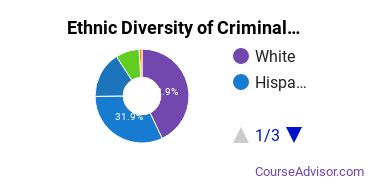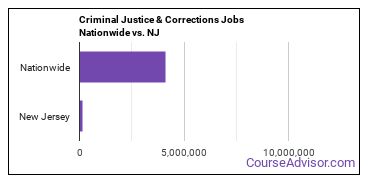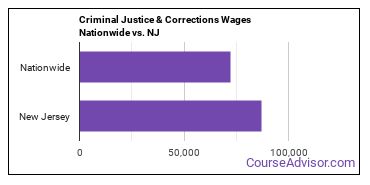Criminal Justice Schools in New Jersey
2,807 students earned Criminal Justice degrees in New Jersey in the 2022-2023 year.
In this state, Criminal Justice is the 7th most popular major out of a total 276 majors commonly available.
Education Levels of Criminal Justice Majors in New Jersey
Criminal Justice majors in the state tend to have the following degree levels:
| Education Level | Number of Grads |
|---|---|
| Bachelor’s Degree | 1,466 |
| Associate Degree | 823 |
| Award Taking Less Than 1 Year | 319 |
| Master’s Degree | 136 |
| Award Taking 1 to 2 Years | 54 |
| Award Taking 2 to 4 Years | 54 |
| Doctor’s Degree (Research / Scholarship) | 9 |
| Doctor’s Degree (Professional Practice) | 9 |
| Doctor’s Degree (Other) | 9 |
Gender Distribution
In New Jersey, a criminal justice major is more popular with men than with women.

Racial Distribution
The racial distribution of criminal justice majors in New Jersey is as follows:
- Asian: 3.4%
- Black or African American: 16.4%
- Hispanic or Latino: 32.1%
- White: 39.2%
- Non-Resident Alien: 1.0%
- Other Races: 7.9%

Jobs for Criminal Justice Grads in New Jersey
There are 122,350 people in the state and 4,117,080 people in the nation working in criminal justice jobs.

Wages for Criminal Justice Jobs in New Jersey
In this state, criminal justice grads earn an average of $87,300. Nationwide, they make an average of $72,390.

Most Popular Criminal Justice Programs in NJ
There are 10 colleges in New Jersey that offer criminal justice degrees. Learn about the most popular 10 below:
Students enjoy a student to faculty ratio of 16 to 1. Seeking financial aid? At this school, 93% of students receive it. Of all the teachers who work at the school, 46% are considered full time.
Request InformationThe average student takes 4.48 years to complete their degree at Rutgers Newark. The student to faculty ratio is 13 to 1. Students who attend this public school pay an average net price of $17,508.
Request Information15 to 1 is the student to faculty ratio. It takes the average student 4.26 years to graduate. 58% of the teachers are full time.
Request Information97% of students are awarded financial aid at this school. Most students complete their degree in 4.38 years. 14 to 1 is the student to faculty ratio.
Request Information99% of students are awarded financial aid at this school. Most students complete their degree in 4.66 years. Of all the teachers who work at the school, 28% are considered full time.
Request Information15 to 1 is the student to faculty ratio. 97% of students are awarded financial aid at this school. It takes the average student 4.45 years to graduate.
Request InformationA typical student attending NJCU will pay a net price of $18,862. 97% of students are awarded financial aid at this school. Most students complete their degree in 4.87 years.
Request Information100% of the teachers are full time. 59% of students get financical aid. Students enjoy a student to faculty ratio of 19 to 1.
Request InformationIt takes the average student 4.59 years to graduate. 96% of students get financical aid. The full-time teacher rate is 48%.
Request InformationOf all the teachers who work at the school, 33% are considered full time. 17 to 1 is the student to faculty ratio. 63% of students are awarded financial aid at this school.
Request InformationCriminal Justice Careers in NJ
Some of the careers criminal justice majors go into include:
| Job Title | NJ Job Growth | NJ Median Salary |
|---|---|---|
| Financial Examiners | 9% | $97,410 |
| Computer Workers | 7% | $99,500 |
| Emergency Management Directors | -3% | $95,330 |
Related Majors in New Jersey
Below are some popular majors in the state that are similar to criminal justice.
| Major | Annual Graduates in NJ |
|---|---|
| Homeland Security | 252 |
| Fire Protection | 54 |
| 24 | |
| Other Homeland Security | 24 |
View all majors related to Criminal Justice
Explore Major by State
Alabama
Arkansas
Connecticut
Florida
Idaho
Iowa
Louisiana
Massachusetts
Mississippi
Nebraska
New Jersey
North Carolina
Oklahoma
Rhode Island
Tennessee
Vermont
West Virginia
View Nationwide Criminal Justice Report
References
More about our data sources and methodologies.





